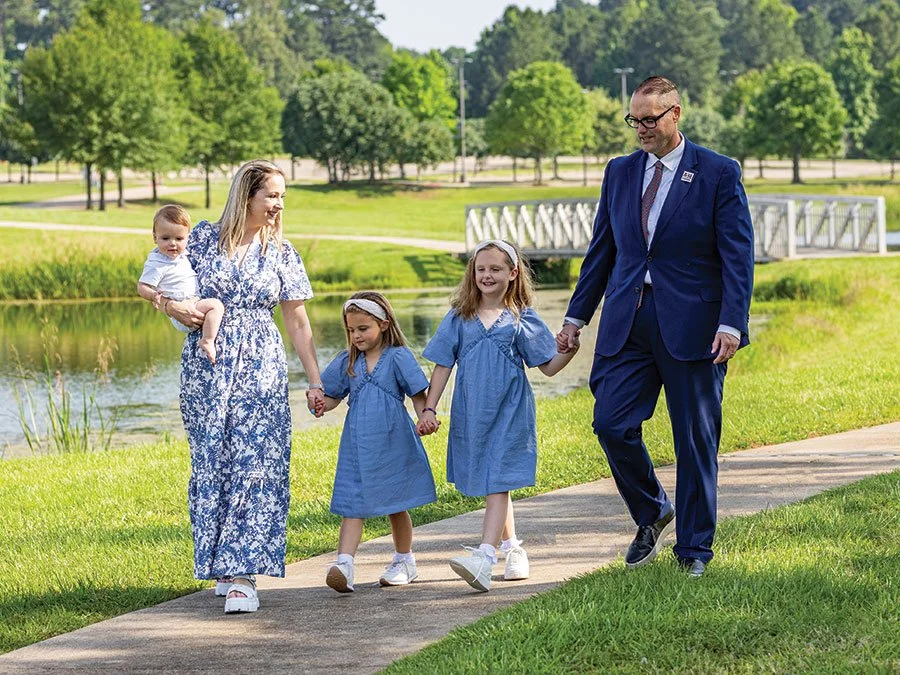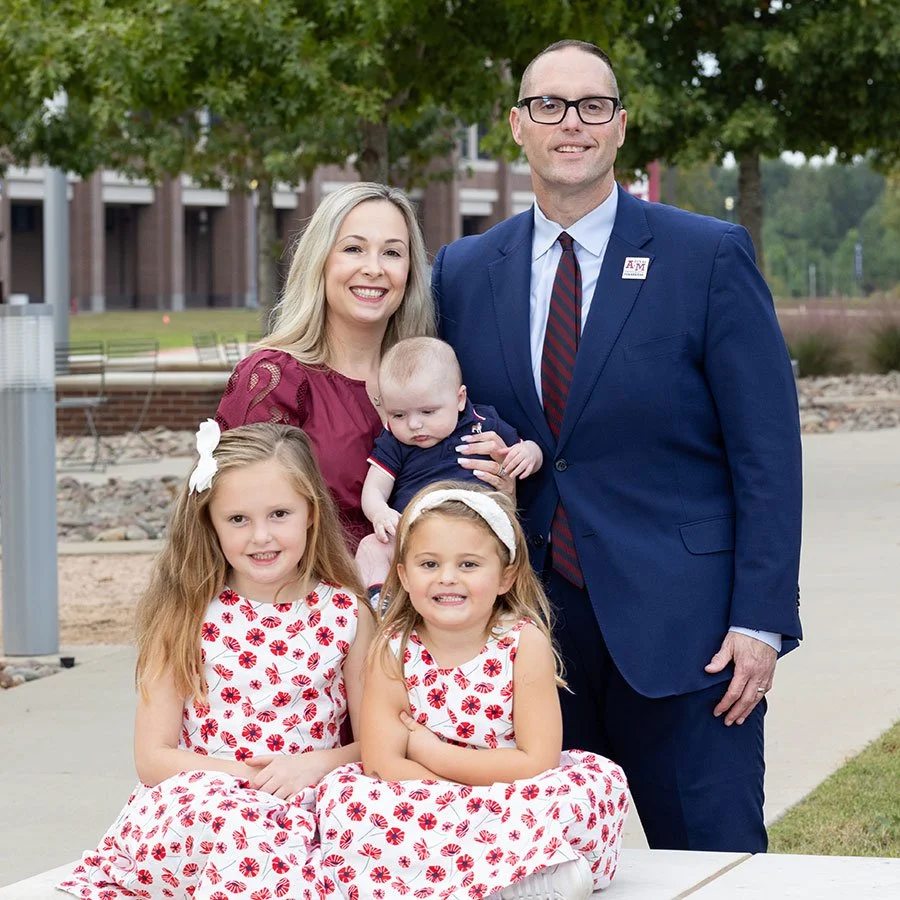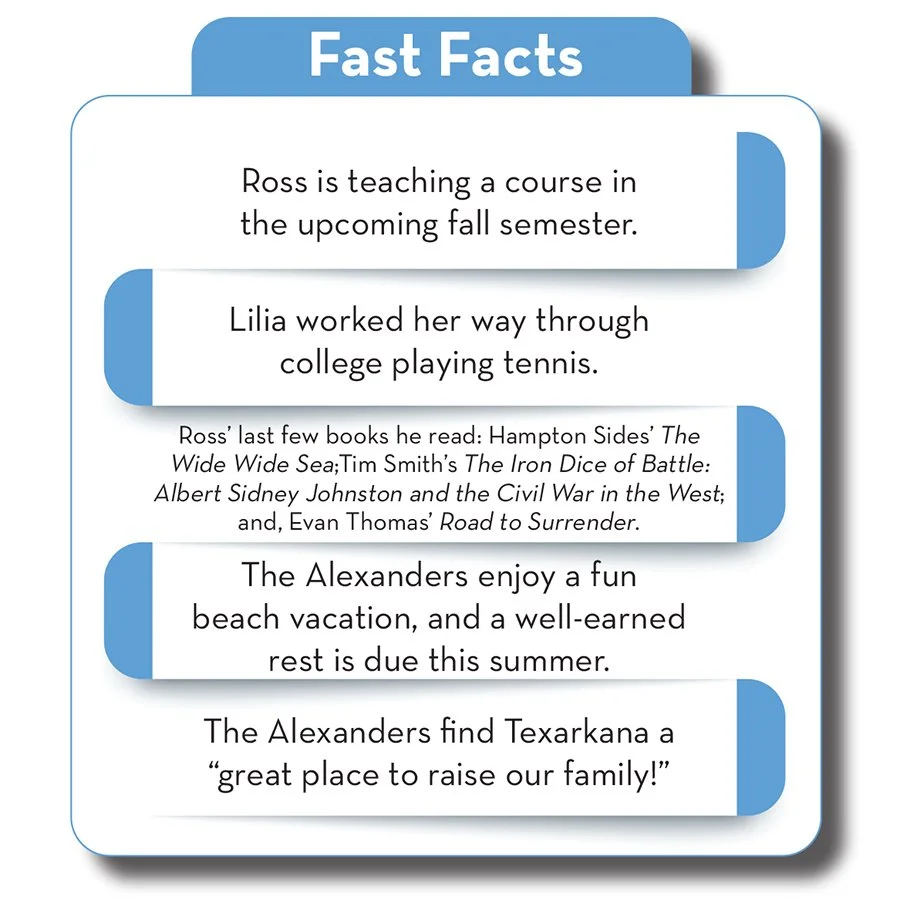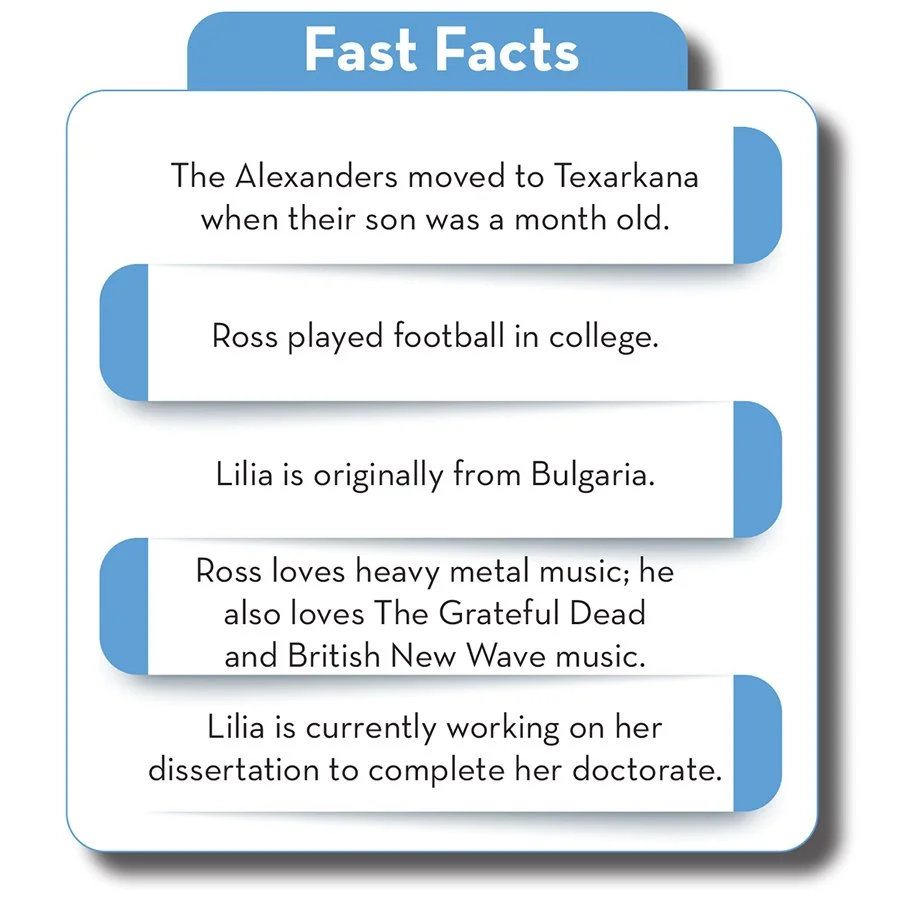Meet Texas A&M–Texarkana's Fifth President
/Dr. Ross Alexander shares thoughts on family and his plans for the future of the university
By Ellen Orr and Dr. Robin Rogers
photo by john bunch.
Leaders are not born; they are built from years of work, education, life influences, and choices. The importance of finding a leader of strong character and dedication to students was paramount in the selection of Texas A&M University–Texarkana’s fifth president. Dr. Ross Alexander is completing his first academic year as president. A family man raised with a strong midwestern work ethic, Ross leads in this role with dedication and community-mindedness.
“For me, it all starts with my family,” he said. “My wife is Lilia, and we’ve been married for 12 years. And whatever organizational leadership accomplishments I have, they pale in comparison to my greatest accomplishment, which was somehow convincing her to marry me. She’s really my North Star.”
The Alexanders have three children: 7-year-old Victoria, 5-year-old Madelaine, and Ross Jr., who is 10 months old.
“We like to say we do all of our life transitions at once,” Ross laughed. “So, new job, new baby, new house, and a move across the country.”
“We were purposeful about coming to Texas, a state that funds higher education. We had high expectations, and they’ve only been exceeded.”
Ross grew up in the Midwest, in a family of dairy farmers and Eastern European immigrants. “Hard work was part and parcel of my upbringing,” he said. “My dad worked on a dairy farm, and my mom’s family worked in the slaughterhouses of Milwaukee. I was raised with a strong Midwestern work ethic, and [as a young adult] I applied that to a higher-education career.”
photo by john bunch.
As an undergraduate student at Beloit College, Ross majored in political science and history, aspiring to a career in law or government. He accredits this interest in large part to his parents.
“I grew up in a politically active-household,” he said. “My parents always voted in every election; one was Republican, and one was a Democrat, which made for interesting conversations. My mother had a long career as a municipal leader; she was a city clerk for many, many years in Beloit, Wisconsin. So we were a very politically literate family.”
With the intention of working in local government, Ross pursued a master’s degree in public administration, with a subspeciality of city/county management, at Arizona State University. While there, he found that he thrived in academia.
“I just really kind of flourished,” he said. “So, kind of on a whim, I applied to a few PhD programs.” He chose to attend Northern Illinois University. “They gave me an opportunity to get in a classroom right away,” he said.
A natural educator, Ross maintains his passion for teaching to this day. “I’m a professor at heart,” he said. “I still teach, and I’m teaching a class this coming fall. It’s how you stay connected with the students and how you keep up with the educational technologies.”
From this passion grew Ross’ ambition to lead a university. “In my late 20s, as a brand new professor, I knew I wanted to pursue leadership responsibilities, up to becoming the president of a university one day,” he said. “So I never said no to an opportunity. I always raised my hand to chair a committee or do the extra work. I pursued opportunities to learn more and gain leadership experiences.”
Over the last 22 years, Ross has risen from instructor to assistant professor to department head, from director to associate vice chancellor. From 2017 to 2023, he served the University of North Alabama as their provost and executive vice president for academic affairs. In August 2023, he stepped into his current role at TAMU–T.
“I was hired with a very specific charge from my boss, Chancellor John Sharp [who leads the A&M System]: to grow this university,” Ross said. “And there’s so much opportunity and potential here that, I think in very short order, this place is going to absolutely explode.”
Texas A&M–Texarkana is currently experiencing record enrollment, with spring 2024 enrollment up 5% from last year. Ross’ plan is three-pronged: “Our enrollment growth strategy is one that’s intentionally diversified,” he said. “We want to grow on campus, we want to grow online, and we want to grow internationally.”
To nourish and expand the on-campus student body, the university has implemented what they call their 100-mile strategy.
“A lot of the feedback we had gotten even before I got here was that perhaps A&M–Texarkana didn’t recruit or prioritize the Texarkana community enough with its enrollment recruitment strategy,” Ross explained. “But the purpose of any public regional comprehensive university is to serve the community.
“So if you draw a 100-mile circle around our campus, that’s our backyard,” he continued. “We want to be the first-choice institution for on-campus learners in our backyard. We are recruiting like crazy at every single high school within 100 miles and at every community college within 125 miles, and we offer a first-in-class scholarship to every high school graduate and every community college transfer within that 100 or 125 miles.”
Texas A&M–Texarkana offers a full college experience, with athletics, student organizations, and varied academic options. Ross is determined that area students see TAMU–T as a top choice for undergraduate education.
“If you get a 35 on your ACT and get into Harvard, Princeton, or Yale, by all means, go to Harvard, Princeton, or Yale. If you want to have the large college experience, go to Fayetteville, College Station, or UT. But when local students are choosing other regional campuses in Arkansas, Oklahoma, and Texas, that’s where I get competitive,” he said. “And that’s where we’re not going to be beat.”
To that end, the university is further developing its on-campus experience. Ross said that more than 20 degree programs are slated to be added within the next few years, all of which are in the fields of healthcare, technology, advanced manufacturing, engineering, and financial services, “because those are the growing areas in our region,” he explained. “We’re building new facilities, including an on-campus athletics complex for our baseball, softball, and tennis teams. We’re offering additional food service options, et cetera. That’s largely the on-campus student recruitment strategy, and the initial enrollment indicators are robust: we’re up 35% to 50% on every enrollment indicator for the fall from our local market.”
Online education, too, is crucial. “For the online learner, we’re focused on adults in the region,” Ross said. “How we can provide educational opportunities for adults in the region is by partnering with their employers.” The university has forged over 30 partnerships with large area employers.
“We’re an education solutions provider to our corporate partners and their existing workforce,” he continued. “We offer every employee at least a 25% tuition scholarship and their first class free as an incentive to finish their bachelor’s degree or master’s degree, to get a credential that will help them upskill and advance in their careers.”
To recruit international students, the university is leveraging their STEM programs. Students from South Asia and Southeast Asia have high visa-approval rates, come from Western educational backgrounds, and typically speak English. Statistically, students in this demographic often pursue STEM degrees, and many will choose to remain in Texarkana after graduation, contributing to the local workforce.
“So that’s kind of the third leg of the stool for student recruitment strategy,” Ross said. “Put all of that together, and we’re going to grow quickly.”
Ross says that his family is here for the long haul.
“We were purposeful about coming to Texas, a state that funds higher education,” he said. “We had high expectations, and they’ve only been exceeded. What we’ve been most pleased with is this community—the hospitality, the support. My daughters love their schools. It’s a great place to raise a family.”
Ross is an incredible asset to Texarkana—as is Lilia, who is currently finishing her PhD in educational policy studies.
“She’s the smartest, most capable, brightest, most talented person I’ve ever met,” Ross said. “She balances community engagement responsibilities with parenting three young children, and then she works full-time [online, as a political science educator with Indiana University East]. She really is an inspiration. I always say that, as a couple, we speak six languages: she speaks five, and I speak one. She’s polylingual and just very, very sophisticated.”
As a family, the Alexanders are invested in the community and believe that Texarkana is on the brink of economic, educational, and cultural explosion.
“Texarkana has so much to offer,” Ross said. “Just as the university is kind of at a tipping or inflection point, Texarkana as a community is kind of at a tipping point from an economic development perspective, from a growth perspective. And I really feel like A&M–Texarkana can be a catalyst for the next phase of growth for Texarkana, for the region and its workforce.”
Though his means are complex, Dr. Ross Alexander’s ends are simple: “It’s our goal to be the first-choice institution for learners, across a career and throughout a lifetime,” he said.




